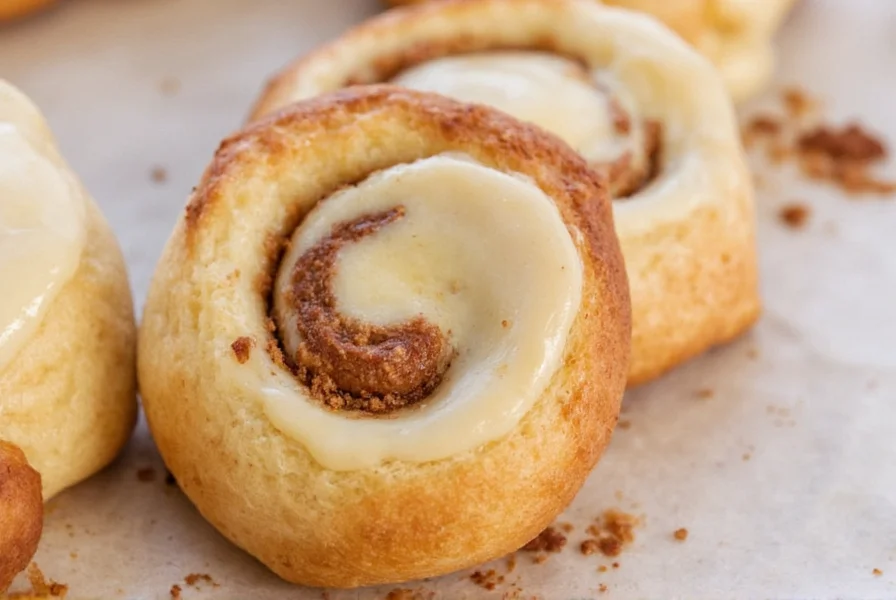Cream cheese cinnamon rolls represent the ultimate indulgence in breakfast pastry perfection. Unlike standard cinnamon rolls, these decadent treats incorporate cream cheese directly into both the filling and frosting, creating a richer, more complex flavor profile with a subtle tang that balances the sweetness. The magic happens when the cream cheese melts during baking, creating pockets of creamy richness throughout the dough.
Why Cream Cheese Makes the Difference
The addition of cream cheese transforms ordinary cinnamon rolls into something extraordinary. When properly incorporated, cream cheese:
- Creates a more tender crumb structure in the dough
- Adds a subtle tang that balances the sweetness
- Provides moisture that keeps rolls fresh longer
- Creates a luxurious mouthfeel that regular rolls lack

Essential Ingredients Breakdown
Understanding each component's role ensures perfect homemade cream cheese cinnamon rolls every time:
| Ingredient | Function | Pro Tips |
|---|---|---|
| All-purpose flour | Provides structure | Measure by weight (120g/cup) for accuracy |
| Unsalted butter | Adds richness and tenderness | Use European-style (82% fat) for best results |
| Cream cheese | Creates signature flavor and texture | Full-fat block style, not spreadable tubs |
| Active dry yeast | Leavening agent for rise | Proof in warm milk with pinch of sugar first |
Step-by-Step Preparation Guide
Follow these precise steps for flawless cream cheese cinnamon rolls from scratch:
- Dough preparation: Combine warm milk (110°F), yeast, and sugar. Wait 5-10 minutes until foamy. Mix with flour, egg, and melted butter until a soft dough forms.
- First rise: Knead 5-7 minutes until smooth and elastic. Place in greased bowl, cover, and let rise until doubled (1-1.5 hours).
- Filling creation: Beat softened cream cheese, brown sugar, cinnamon, and melted butter until smooth. Spread evenly over rolled dough.
- Rolling technique: Roll dough tightly from long edge, pinch seam closed. Cut with dental floss for clean slices.
- Second rise: Place in greased pan, cover, and let rise until puffy (30-45 minutes).
- Baking perfection: Bake at 350°F for 22-25 minutes until golden brown but not overdone.
- Frosting application: Mix cream cheese, powdered sugar, milk, and vanilla. Spread while rolls are still warm.
Professional Baking Tips
Achieve bakery-quality cream cheese cinnamon rolls with these expert techniques:
- Dough temperature control: Keep ingredients at room temperature for optimal yeast activity and cream cheese incorporation
- Filling consistency: Your cream cheese filling should be spreadable but not runny—chill briefly if too soft
- Cutting precision: Use unflavored dental floss to slice rolls cleanly without squishing
- Baking temperature: Use an oven thermometer to verify actual temperature—many ovens run hot or cold
- Doneness test: Internal temperature should reach 190°F for perfectly baked rolls
Troubleshooting Common Issues
Solve these frequent cream cheese cinnamon roll problems:
| Problem | Causes | Solutions |
|---|---|---|
| Dense, heavy rolls | Overflouring, underproofing, old yeast | Measure flour by weight, verify yeast activity, allow full rise time |
| Filling leaking out | Too much filling, dough too cold, improper rolling | Use recommended filling amount, ensure dough is room temperature, roll tightly |
| Bland flavor | Insufficient cinnamon, low-quality ingredients | Use fresh cinnamon, quality cream cheese, proper sugar ratios |
| Soggy bottom | Underbaked, too much filling moisture | Bake until internal temp reaches 190°F, reduce filling moisture slightly |
Delicious Variations to Try
Once you've mastered the basic cream cheese cinnamon roll recipe, experiment with these popular variations:
- Overnight cream cheese cinnamon rolls: Prepare rolls, refrigerate overnight, then bake in the morning
- Apple cinnamon cream cheese rolls: Add finely diced apples to the filling mixture
- Bacon maple cream cheese rolls: Incorporate crumbled bacon and maple syrup into the frosting
- Overdosed cinnamon cream cheese rolls: Double the cinnamon for a more intense spice flavor
Storage and Reheating Instructions
Proper storage maintains the soft texture of your cream cheese cinnamon rolls:
- Room temperature: Store in airtight container for up to 2 days (frosting may soften)
- Refrigerator: Keep up to 5 days—reheat before serving for best texture
- Freezer: Freeze unfrosted rolls for up to 3 months; thaw and bake as needed
For optimal reheating, place individual rolls on a microwave-safe plate and heat for 15-20 seconds. Alternatively, warm in a 300°F oven for 5-7 minutes for more even heating without texture compromise.
Frequently Asked Questions
Can I make cream cheese cinnamon rolls without yeast?
Yes, you can create yeast-free cream cheese cinnamon rolls using baking powder and baking soda as leaveners. However, the texture will differ significantly from traditional yeast rolls. Yeast provides the characteristic airy structure and complex flavor development that chemical leaveners cannot replicate. For authentic soft cream cheese cinnamon rolls, yeast remains essential.
Why did my cream cheese filling leak out during baking?
Cream cheese filling leakage typically occurs when the filling contains too much moisture, the dough is too cold when rolled, or you've applied too much filling. To prevent this, ensure your cream cheese is at proper room temperature (not runny), use the recommended filling quantity, and let your rolled dough rest at room temperature for 10-15 minutes before baking to allow the dough to relax.
How do I prevent my cream cheese cinnamon rolls from becoming dry?
To maintain moisture in cream cheese cinnamon rolls, avoid overbaking (remove when internal temperature reaches 190°F), don't over-flour your dough, and ensure proper fat content in both dough and filling. Adding a tablespoon of honey to the dough can also help retain moisture. Proper storage in an airtight container prevents drying out after baking.
Can I prepare cream cheese cinnamon rolls ahead of time?
Absolutely. The best method for preparing cream cheese cinnamon rolls ahead is the overnight refrigeration technique. Assemble the rolls in your baking pan, cover tightly, and refrigerate for up to 18 hours. Remove from refrigerator 30 minutes before baking to take the chill off, then bake as directed. This method actually enhances flavor development while saving morning preparation time.
What's the ideal baking temperature for cream cheese cinnamon rolls?
The optimal baking temperature for cream cheese cinnamon rolls is 350°F (175°C). This moderate heat allows the rolls to rise fully before the exterior sets, creating that perfect soft interior. Higher temperatures cause premature crust formation, while lower temperatures extend baking time unnecessarily. Always verify your oven temperature with an independent thermometer for best results with cream cheese cinnamon rolls.











 浙公网安备
33010002000092号
浙公网安备
33010002000092号 浙B2-20120091-4
浙B2-20120091-4